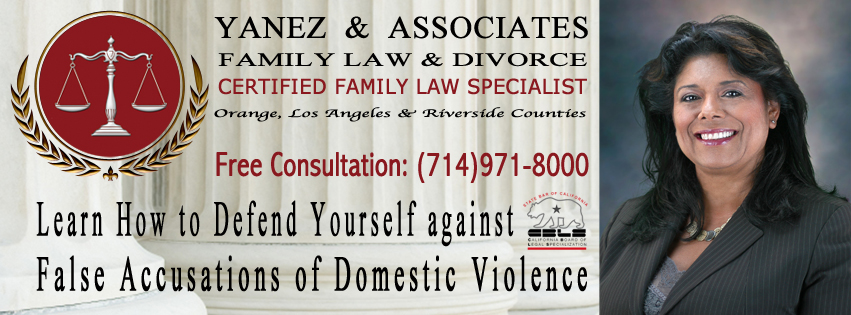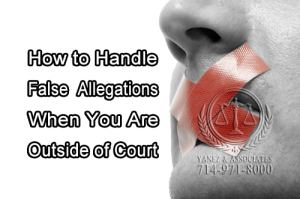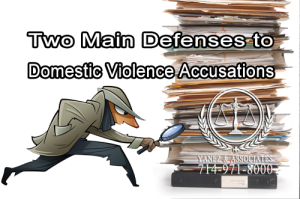How to fight false allegations of domestic abuse in Orange County, California
How to Defend Yourself against False Accusations of Domestic Violence if you have been accused of domestic violence in California, whether the accusations are true or false, you need to consult with a criminal defense attorney who also has experience in family law.
Potential Consequences of a Domestic Violence Conviction in California
If you fail to contact a quality criminal defense attorney, the allegations against you could lead to serious consequences. Domestic violence allegations can lead to both civil and criminal consequences. Criminally, you could face charges of assault and battery, and you may face fines or jail time.
Civilly, your consequences can include the following:
• Child Custody - In most cases in California, if you have a history of domestic violence, especially if it includes child abuse or neglect, you could lose custody of your children.
• Mediation - Mediation can offer numerous benefits during divorce or child custody disputes. However, a history of domestic violence often rules out mediation as an option, much less a requirement for solving family law disputes.
• Restraining Orders - A domestic violence restraining order can be issued temporarily even prior to a domestic violence restraining order hearing. Restraining orders can prevent the accused abuser from spending time in his or her home, with his or her children, and more.
• Restraining Order Violations - The restraining order will also prevent contact from the protected persons. Violating the terms of a restraining order can lead to criminal charges.
• Parenting - Restraining orders and domestic violence convictions can both prevent an accused abuser who is a parent from spending time with his or her children, regardless of the current custody agreement.
• Rehabilitation Programs - In order to initiate contact with an accused or convicted abuser’s children, the Court can order anger management classes, therapy, or chemical dependency meetings.
• Gun Use - As part of most domestic violence restraining orders, the restrained person cannot own or possess any firearm for any purpose.
How to Handle False Allegations When You Are Outside of Court
Coming out of the process of defending yourself against false accusations of domestic violence depends as much on what you do when you are not in the courtroom as it does what you do when you are in it.
First, follow the terms of any restraining orders that may be in effect. A temporary restraining order will not last more than three to four weeks, and as awful as it may be to have to deal with the consequences of the restraining order when you have done nothing wrong, you are much more likely to have all charges dropped and your rights and privileges reinstated when you prove that you can follow the terms of a court order.
In addition, watch your words carefully. If you can spend time with your children during the legal process of defending yourself, do not make jokes that could be taken the wrong way, or rough house with the children. It is in your best interest at this point to always have another adult present when you spend time with the children so that you have a witness who can speak on your behalf. Do your best to maintain positive relationships with your children.
Hire a qualified lawyer. Don’t assume that the charges will just go away. Even if you are innocent, it is better to have a quality defense attorney on your side. If you have questions or concerns, you attorney will be there to assist you. Try to appreciate that the court does not know you, and it is their job to investigate all allegations of child abuse and domestic violence in order to protect the community.
Two Main Defenses to Domestic Violence Accusations
The two main ways to defend against false accusations of domestic violence are to prove that the prosecution has not proven your guilt, or to offer a defense that proves innocence.
Show That Guilt has not Been Proven
In order to prove that a criminal act has occurred, the prosecution needs to prove, beyond a reasonable doubt, that the criminal act occurred, and that the defendant committed the act with intent. This means that in order to prove that a person is guilty of domestic violence, the following need to be proved.
• The victim was protected by the domestic violence statute. Domestic violence occurs between two people who have a close relationship, like a spouse, partner, former spouse or partner, sibling, grandparent, parent, or child. If the relationship between the victim and alleged abuser is not one that constitutes domestic violence, then the domestic violence did not occur.
• The violence occurred. In order to be convicted of domestic violence, an act of assault, stalking, harassment, sexual abuse, or another type of included domestic violence must have taken place.
• The defendant in question committed the act. In order to be convicted of domestic violence, it must be shown that you committed the act of domestic violence, not just that it occurred. If you have a viable alibi, the prosecution may not be able to prove this.
• Depending on the type of violence, the prosecution must prove that that action occurred. This depends on the State of California’s elements of stalking, or harassment, or sexual abuse, etc.
Prove Your Innocence
If you or your attorney can show that the actions taken were in self defense, then the initial instigator is the prosecution, or the supposed victim. Or, you may have an alibi, or some proof that you are innocent, whether or not the act occurred. In this case, it is your best option to contact a defense lawyer.
Contact an Orange County Attorney to learn more on How to Defend Yourself against False Accusations of Domestic Violence
If you are facing charges of domestic violence, always contact an attorney. At Yanez & Associates, we have attorneys that are experienced in both family law and criminal defense. If you have been accused of domestic violence, do not hesitate to contact us. Schedule your free initial consultation today.

Learn How to Defend Yourself against False Accusations of Domestic Violence in Orange County California












